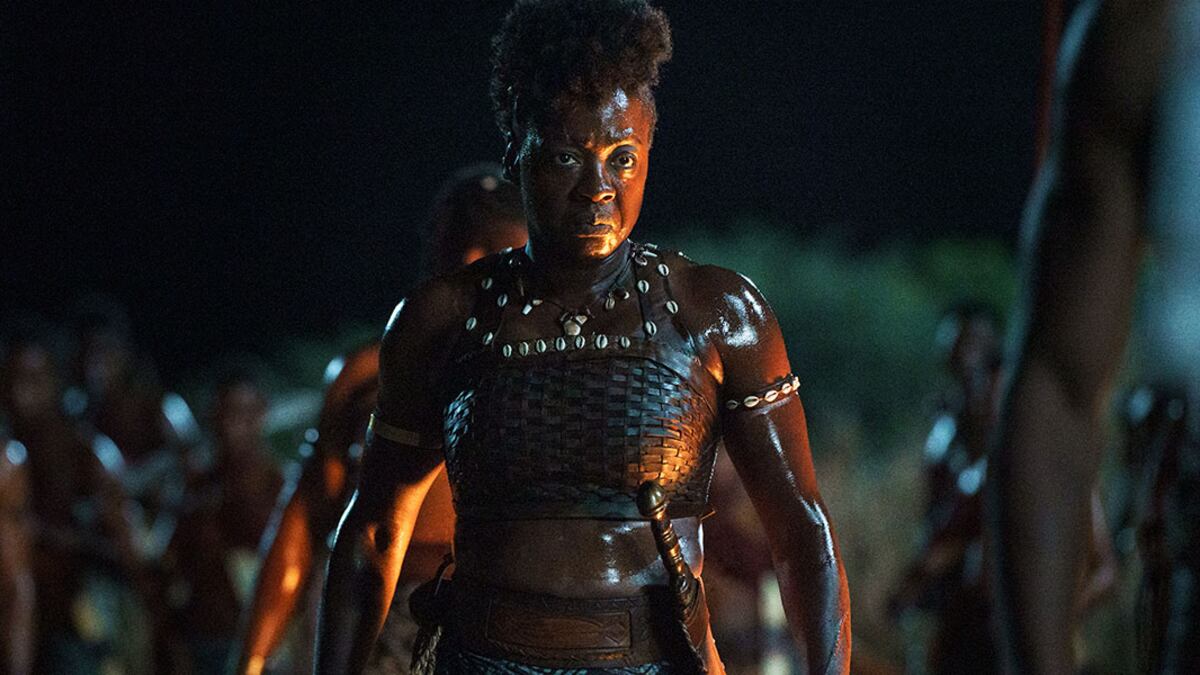James Lipton once asked Chris Rock during an episode of Inside the Actors Studio if he would explain the use of the N-word in Black culture to his audience—prompting Rock to look back at him with the wide-eyed, terrified response, “Now I got this job!?”
A similar sentiment surely haunted everyone involved with The Woman King, which attempts to tell a 19th century African story to a multicultural audience. The film has received plenty of scrutiny already, both from people skeptical that it could offer an accurate portrait of Africans’ role in atrocities as well as those looking for a beacon of light to be shone on a misunderstood people and their history.
“I knew what it would mean to us as Black people,” the film’s star Viola Davis told Vanity Fair. “Something that has never been done before. And what it would mean for Black women sitting in that movie theater. The responsibility is high.”
The Woman King rejects the notion that its responsibility is to teach African history in two hours. Instead, it tells a tale of pride, dignity and agency against the backdrop of the fascinating Kingdom of Dahomey. In short, filmmaker Gina Prince-Bythewood (who wrote for A Different World and directed Love & Basketball and The Old Guard) and a stellar cast bring the legendary Agoji warrior women to life.
Davis does an amazing job of playing Davis, without ever seeming to embody the persona of a stoic African warrior. Lucky for the film, this hardly matters. The sheer force she brings as an actor provides the essential emotional beats that a more authentic portrayal might have asked her to sacrifice.
Meanwhile, the supporting cast of fellow warriors accomplishes an astonishing amount of characterization through slight looks and limited dialogue that distinguish each of them within the unit. But the breakout star is the young Thuso Mbedu, who plays the headstrong recruit Nawi.
At the beginning of the film, Nawi is a teenage girl being married off by her caregiver. Vigorously resistant to the choice being made for her, she’s sent to live and train with the Agoji warriors, which requires her to take no lovers and bear no children (it’s not unlike joining the Night’s Watch in Game of Thrones). She’s stubborn, but her desire to be a warrior drives her through brutal trials to become a proud warrior.
Set in 1823, The Woman King finds the Dahomey in a cyclical conflict with a neighboring tribe, enriching themselves with the sale of each other’s prisoners to the international slave trade—and King Ghezo (John Boyega) of the Dahomey is being pressured to abandon the practice.
The tribe’s most passionate advocate for forsaking the slave trade is Nanisca (Davis), the general who leads the Agoji, which is Ghezo’s fiercest fighting force. Her previous experience in slavery traumatized her to the point of clarity, convincing her that the Dahomey must break from the system they’ve chained themselves to before the tribes devastate each other.
The brutality on display in the tribal war is measured. This is a PG-13 movie, after all, and the filmmakers seem to have chosen accessibility over a fiercely accurate, R-rated depiction of war and slavery. That may be the one thing holding The Woman King back from being an epic, as opposed to merely a very good film.
This is in line with Roland Emmerich’s “historical” Revolutionary War film The Patriot (2000). Both movies loosely tie together backstories within an authentic setting while shoehorning an egregious love story into the plot (again, chalk it up to the accessibility factor).
The Woman King sidesteps the accusations of its loudest prerelease critics, who demanded that all warts be shown in its depiction of the French, the African tribes and the slave trade. The trailer elicited quite a backlash from people who claimed the film would depict the “noble” Africans murdering their “evil” white oppressors.
Not so much, it turns out. In The Woman King, the Africans are shown with relative historical accuracy concerning their own brutal war tactics, slavery for profit, and attitudes towards women. And as for the French slavers, they’re not demonized beyond the understanding that the slave trade existed.
In other words, The Woman King is directed at a Black audience, but it’s a movie for everybody. And if it causes people with racial animus to inadvertently study African history? Cool.
SEE IT: The Woman King, rated PG-13, plays at Bridgeport, Cedar Hills, City Center, Clackamas, Division, Eastport, Evergreen Parkway, Living Room, Lloyd Center, Mill Plain, Pioneer Place, Progress Ridge, Studio One, Tigard, Vancouver Plaza.
